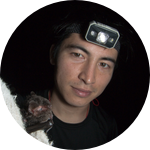About This Project
JP / EN The Ryukyu tube-nosed bat and Yanbaru whiskered bat are two endangered bats that only exist in the remaining forests of three islands in the Ryukyu Archipelago, Japan. However, we don't know enough about these bats to design conservation strategies for them. I will extract and analyze the DNA from 50 previously collected bat poop samples from Okinawa. The DNA will tell us what the bats are eating, which in turn will tell us where they are eating, and therefore where to protect.
Ask the Scientists
Join The DiscussionWhat is the context of this research?
The lack of even basic information required to guide recovery of the Ryukyu tube-nosed and Yanbaru whiskered bats is what drew me to study these mysterious mammals. Although there have been surveys on Tokunoshima and Amami-Oshima, Okinawa received no attention after the initial discovery of these species there in 1996. My capture of a Yanbaru whiskered bat on Okinawa was the first reported from the island in 22 years! After two years of tracking the Yanbaru whiskered bat and Ryukyu tube-nosed bat on Okinawa, I have figured out that these bats roost mainly in tree holes and understory leaves, respectively. In the process of catching bats for tracking, I collected their poop. Using this poop, I now want to provide the first information on what these bats eat.
What is the significance of this project?
Bats are hugely important predators of insects, with insectivorous bats able to eat over half of their body weight in insects a night! However, we day-walking humans don't always notice the contribution or plight of nocturnal bats. Though not bat-focused, there is currently a strong push to designate the forests of the Ryukyu Archipelago as a UNESCO World Natural Heritage site, and efforts are being made to improve the management of native ecosystems. Now is therefore the perfect opportunity to advocate for the conservation of historically unnoticed native bats. If I can present decision-makers with information on these bats, including a description of their diet, this will go a long way in getting their recovery included as a goal for future forest management.
What are the goals of the project?
The goal of this project is to extract and analyze DNA from already collected poop samples to figure out what Okinawa’s endangered bats eat and thus, where they eat. By determining what types of prey are in the poop of the Ryukyu tube-nosed bat and Yanbaru whiskered bat, I can deduce what habitats are important to the conservation of these mysterious furry flyers. I will also be able to answer interesting questions such as: “do Ryukyu tube-nosed bats really feed on the ground?” or “Are streams critical foraging grounds for the Yanbaru whiskered bat?” Finally, not only will my results be presented to the scientific and local communities, the results of my investigations will be used as the basis for conservation recommendations for these species.
Budget
Although the cost of genetic analysis has reduced greatly in the last couple decades, it is still a lot of money. I was very grateful to receive grants that supported me through the long field trips to Okinawa needed to track the Ryukyu tube-nosed and Yanbaru whiskered bats, but sadly, I do not have enough funding yet to complete my dietary analysis, the last stage of my PhD work. Your support will be used to purchase the supplies needed to pull out and interpret as much information (DNA) as possible out of the humble brown rice grain-sized bat poops I have collected in the Okinawan forest.
Endorsed by
 Project Timeline
Project Timeline
DNA extraction from the bat feces will begin as soon as we have the money! If you help me reach my funding goal, I will start working on this important s**t literally and immediately. I am aiming to finish extractions and DNA amplification by December, send off DNA to get sequenced, and match the resulting DNA “barcodes” to kinds of insects for final analysis results by next April.
Oct 08, 2019
Project Launched
Dec 31, 2019
All feces sample DNA extracted
Apr 30, 2020
Sequencing and analysis completed
May 31, 2020
Share final results with backers
Meet the Team
Jason Preble
I am from Hawaiʻi, an archipelago renowned for its natural environment, but also unfortunately for its high rate of native species extinctions. Growing up interested in the outdoors and wildlife, the more I learned, the more I saw the scale of Hawaiʻi’s conservation challenges. My long-term motivation is to improve our stewardship of my home islands and towards that end, I have been studying island conservation in New Zealand and now Japan.
ハワイ出身で、ハワイは自然が有名である列島ですが、残念ながら、絶滅してしまった動植物数が多いことが知られています。小さい頃から外に遊んで野生動物に興味があって、学べば学ぶほどハワイの環境保全問題の大きさを理解するようになりました。長期的な夢は、故郷の島の保全を改善することであり、そのためにニュージーランドと現在日本で島の保全を研究しています。
Project Backers
- 55Backers
- 104%Funded
- $2,921Total Donations
- $53.11Average Donation



